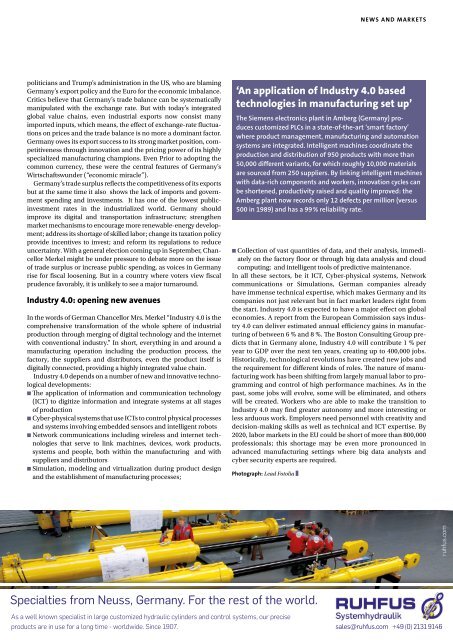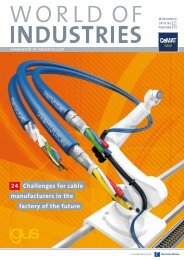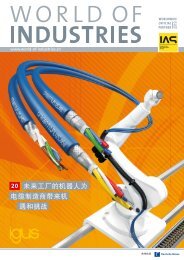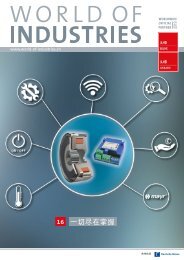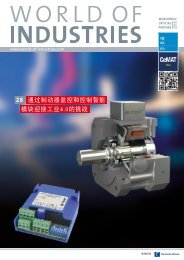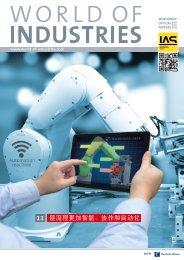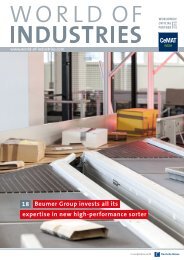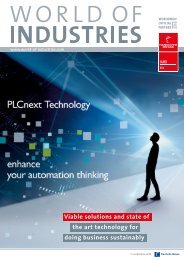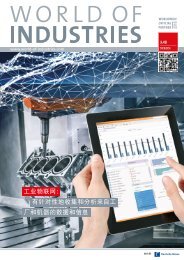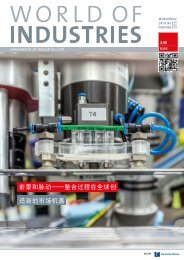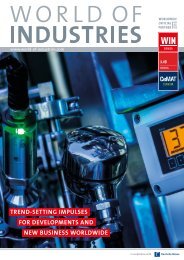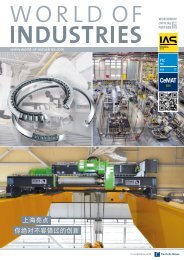world of industries 3/2017 (EN)
world of industries 3/2017 (EN)
world of industries 3/2017 (EN)
- TAGS
- world
- industries
Create successful ePaper yourself
Turn your PDF publications into a flip-book with our unique Google optimized e-Paper software.
NEWS AND MARKETS<br />
politicians and Trump’s administration in the US, who are blaming<br />
Germany’s export policy and the Euro for the economic imbalance.<br />
Critics believe that Germany’s trade balance can be systematically<br />
manipulated with the exchange rate. But with today’s integrated<br />
global value chains, even industrial exports now consist many<br />
imported inputs, which means, the effect <strong>of</strong> exchange-rate fluctuations<br />
on prices and the trade balance is no more a dominant factor.<br />
Germany owes its export success to its strong market position, competitiveness<br />
through innovation and the pricing power <strong>of</strong> its highly<br />
specialized manufacturing champions. Even Prior to adopting the<br />
common currency, these were the central features <strong>of</strong> Germany’s<br />
Wirtschaftswunder (“economic miracle”).<br />
Germany’s trade surplus reflects the competitiveness <strong>of</strong> its exports<br />
but at the same time it also shows the lack <strong>of</strong> imports and government<br />
spending and investments. It has one <strong>of</strong> the lowest publicinvestment<br />
rates in the industrialized <strong>world</strong>. Germany should<br />
improve its digital and transportation infrastructure; strengthen<br />
market mechanisms to encourage more renewable-energy development;<br />
address its shortage <strong>of</strong> skilled labor; change its taxation policy<br />
provide incentives to invest; and reform its regulations to reduce<br />
uncertainty. With a general election coming up in September, Chancellor<br />
Merkel might be under pressure to debate more on the issue<br />
<strong>of</strong> trade surplus or increase public spending, as voices in Germany<br />
rise for fiscal loosening. But in a country where voters view fiscal<br />
prudence favorably, it is unlikely to see a major turnaround.<br />
Industry 4.0: opening new avenues<br />
In the words <strong>of</strong> German Chancellor Mrs. Merkel “Industry 4.0 is the<br />
comprehensive transformation <strong>of</strong> the whole sphere <strong>of</strong> industrial<br />
production through merging <strong>of</strong> digital technology and the internet<br />
with conventional industry.” In short, everything in and around a<br />
manufacturing operation including the production process, the<br />
factory, the suppliers and distributors, even the product itself is<br />
digitally connected, providing a highly integrated value chain.<br />
Industry 4.0 depends on a number <strong>of</strong> new and innovative technological<br />
developments:<br />
n The application <strong>of</strong> information and communication technology<br />
(ICT) to digitize information and integrate systems at all stages<br />
<strong>of</strong> production<br />
n Cyber-physical systems that use ICTs to control physical processes<br />
and systems involving embedded sensors and intelligent robots<br />
n Network communications including wireless and internet technologies<br />
that serve to link machines, devices, work products,<br />
systems and people, both within the manufacturing and with<br />
suppliers and distributors<br />
n Simulation, modeling and virtualization during product design<br />
and the establishment <strong>of</strong> manufacturing processes;<br />
‘An application <strong>of</strong> Industry 4.0 based<br />
technologies in manufacturing set up’<br />
The Siemens electronics plant in Amberg (Germany) produces<br />
customized PLCs in a state-<strong>of</strong>-the-art ‘smart factory’<br />
where product management, manufacturing and automation<br />
systems are integrated. Intelligent machines coordinate the<br />
production and distribution <strong>of</strong> 950 products with more than<br />
50,000 different variants, for which roughly 10,000 materials<br />
are sourced from 250 suppliers. By linking intelligent machines<br />
with data-rich components and workers, innovation cycles can<br />
be shortened, productivity raised and quality improved: the<br />
Amberg plant now records only 12 defects per million (versus<br />
500 in 1989) and has a 99 % reliability rate.<br />
n Collection <strong>of</strong> vast quantities <strong>of</strong> data, and their analysis, immediately<br />
on the factory floor or through big data analysis and cloud<br />
computing; and intelligent tools <strong>of</strong> predictive maintenance.<br />
In all these sectors, be it ICT, Cyber-physical systems, Network<br />
communications or Simulations, German companies already<br />
have immense technical expertise, which makes Germany and its<br />
companies not just relevant but in fact market leaders right from<br />
the start. Industry 4.0 is expected to have a major effect on global<br />
economies. A report from the European Commission says industry<br />
4.0 can deliver estimated annual efficiency gains in manufacturing<br />
<strong>of</strong> between 6 % and 8 %. The Boston Consulting Group predicts<br />
that in Germany alone, Industry 4.0 will contribute 1 % per<br />
year to GDP over the next ten years, creating up to 400,000 jobs.<br />
Historically, technological revolutions have created new jobs and<br />
the requirement for different kinds <strong>of</strong> roles. The nature <strong>of</strong> manufacturing<br />
work has been shifting from largely manual labor to programming<br />
and control <strong>of</strong> high performance machines. As in the<br />
past, some jobs will evolve, some will be eliminated, and others<br />
will be created. Workers who are able to make the transition to<br />
Industry 4.0 may find greater autonomy and more interesting or<br />
less arduous work. Employers need personnel with creativity and<br />
decision-making skills as well as technical and ICT expertise. By<br />
2020, labor markets in the EU could be short <strong>of</strong> more than 800,000<br />
pr<strong>of</strong>essionals; this shortage may be even more pronounced in<br />
advanced manufacturing settings where big data analysts and<br />
cyber security experts are required.<br />
Photograph: Lead Fotolia z<br />
ruhfus.com<br />
Specialties from Neuss, Germany. For the rest <strong>of</strong> the <strong>world</strong>.<br />
As a well known specialist in large customized hydraulic cylinders and control systems, our precise<br />
products are in use for a long time - <strong>world</strong>wide. Since 1907.<br />
sales@ruhfus.com +49 (0) 2131 9146


